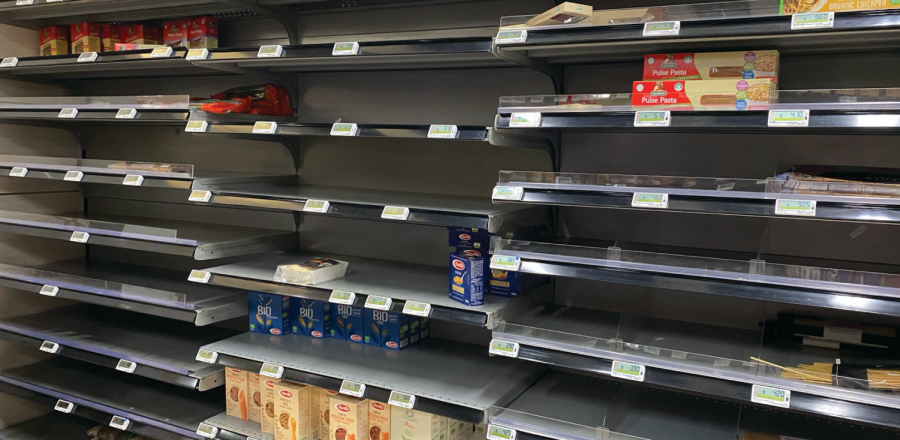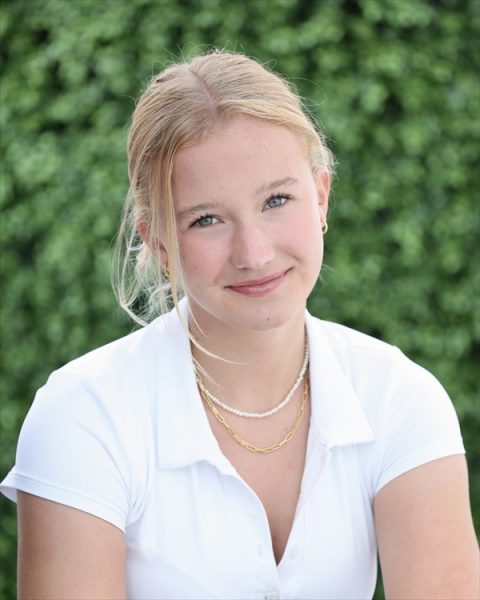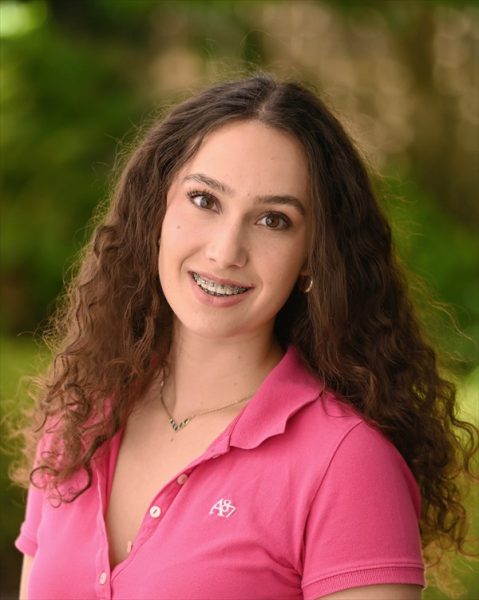Virus causes global health emergency
Coronavirus affects family, friends abroad
Natalie Vulakh, with permission
A grocery store in Singapore is running low on staples such as pasta, oil, flour and rice as families hoard food in preparation of possible quarantine that could prevent shopping. San Francisco residents have reported sending supplies such as food and masks to family and friends living abroad, but face masks are sold out in most drugstores and online.
February 15, 2020
Although there have been no cases of COVID-19, commonly referred to as the coronavirus, in San Francisco, the international outbreak of the virus has affected many members of the Sacred Heart community’s families and
friends living abroad.
COVID-19 is a member of coronaviruses, a large family of viruses found in both humans and animals, but COVID-19 is the first strand to be contracted by humans. Symptoms in humans include fever, shortness of breath and respiratory issues including coughing and sneezing and severe cases of the virus can lead to pneumonia, kidney failure and death.
“I know one girl [in Wuhan] whose grandfather lived in the hospital, caught the infection and died,” Mandarin teacher Yuhong Yao, who has family in Beijing, said. “Her father and mother also got the infection. It’s just terrible.”
Family members living abroad are also being asked to self quarantine as a safety precaution, according to Natalie Vulakh, aunt to senior Gabriella Vulakh and
sophomore Elise Vulakh.
“My kids attend the Singapore American School and one of the teachers from Wuhan had his parents visiting earlier in January,” Natalie Vulakh said. “They were diagnosed with the virus. Everyone got a letter from the school asking people to stay home for 2 weeks if they had been to China just to be safe.”
Individuals traveling in China have been asked to evacuate and have faced travel difficulties, according to a friend of SHHS senior Antoneo Kounalakis, Benjy Renton, who was living in Beijing for a four-week language intensive before he was asked to evacuate.
“I’m thankful that I left when I did, but I know that leaving was
a privilege,” Renton said. “Our local counterparts don’t have the
chance to do that.”
Residents of Beijing are still being asked to quarantine themselves and those people who can are working from home; the city is at a standstill, according
to Renton.
While COVID-19 is not as high risk in the United States as in China, residents are
still worried for family members overseas.
“My family lives in Beijing and I think they are scared,” Yao said. “They wanted me to buy them masks and they’re sold out even in San Francisco. I feel very scared.”
The global demand for masks has led to many stores in China and the United States to be sold out, and car and iPhone manufacturers in China began producing masks to compensate.
Health officials are required to wear an N95 respirator mask when exposed to COVID-19, and disposable masks are only combined with frequent hand washing, according to the World Health Organization.
WHO reported 43,103 confirmed cases across 25 countries and 1,018 confirmed deaths in Novel Coronavirus Situation Report 22 on Feb. 11. From 10 a.m. Feb. 10 to 10 a.m. Feb. 11, WHO reported 2,560 new cases globally.
As of press time, 13 cases of the virus were confirmed in the United States, six of which are in California, according to the Center for Disease Control and Prevention. While the volume of cases in the United States is much lower compared to the 42,708 cases in China, WHO assesses the global risk of COVID-19 as “high” and the risk in China as “very high.”
Despite the high global risk, COVID-19 has not been contracted in San Francisco and residents are at low risk for contracting the virus, according to a press release from the San Francisco Department of Public Health.
Two patients, a husband and wife from San Benito County, were transferred to the University of California San Francisco Helen Diller Medical Center at
Parnassus Heights on Feb. 3.
The husband had recently traveled to Wuhan, while the wife had not, showing the ability for person-to-person transmissions of the virus. The couple’s trans-
fer to UCSF represents no elevated risk of COVID-19 to the public, according to the DPH.
“At this time, residents of the Bay Area are at low risk of becoming infected with this novel coronavirus, unless they have recently traveled to Wuhan or have come in close contact with someone who was ill who recently traveled in that area,” the DPH wrote in a press release.
The only way to prevent COVID-19 is to avoid exposure to the virus, as a vaccine is yet to be created, and there are currently no treatments to cure the illnesses caused by the virus.
Measures to avoid exposure include frequently washing hands, covering the nose and mouth when coughing or sneezing and leaving at least three feet of distance between other people at all times.
“No one really knows how contagious the virus really is,” Vulakh said. “Everyone is takingprecautions.”










